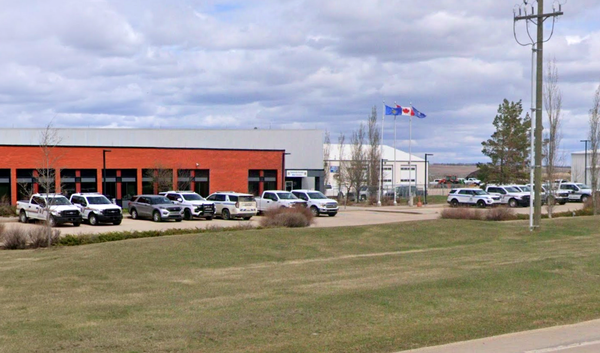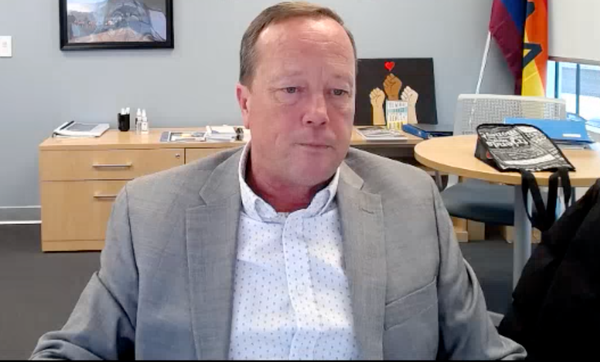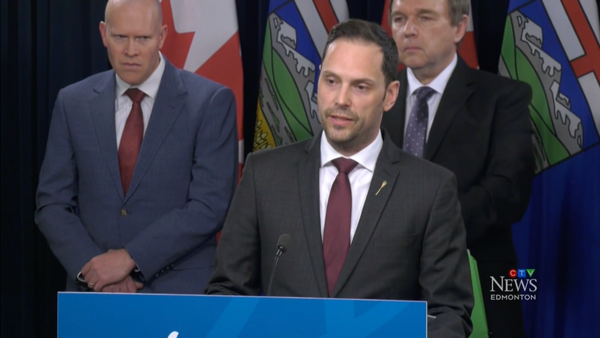A message to Councillors Cartmell, Chabot, Hamilton and Sharp: Step up or resign
Their voluntary legitimization of the provincial public safety task forces aggravates violence against our most vulnerable neighbours while life-saving services get the chop.

The UCP’s Compassionate Intervention Act, UCP-speak for allowing police to force people into abstinence, is now written into Ministry of Mental Health & Addiction’s mandate letter from the Premier. Increasingly, provincial policy can’t be untangled from municipal policy, as the UCP hijacks our municipal governments through allied councillors, police and industry friends in privatized health care and addiction treatment.
“Compassionate Intervention” is being forced into our cities.
It’s been eight months since the UCP set up the Public Safety and Community Response Task Forces in Edmonton and Calgary to address "the issues of addiction, homelessness and public safety, and build on the province’s recovery-oriented system of addiction and mental health care.”
Among many critics, I panned this announcement as pre-election political theatre, geared to disappear unhoused people in the run-up to the election while showing off as many police uniforms in downtown cores as possible. It was designed for UCP-allied councillors in the big cities to give a pre-election boost to their friends on the public safety file.
Mission accomplished? For political theatre and photo ops — yes. On public safety, not so much.
While many on the task force are there as a requirement of their job (City Manager, Fire Chief, EMS Chief) others are elected officials with autonomy and an obligation to speak up or resign in protest.
Looking at you, Councillors Tim Cartmell, Sarah Hamilton, Andre Chabot and Sonya Sharp.
In particular, Cllrs. Cartmell and Hamilton’s servitude to Smith and the UCP may have earned them political capital, but how many people have to die before they take action? What meaningful actions or recommendations have been provided as a result of their work?
At Premier Smith's swearing in, Cllr. Cartmell was hosted privately with the Premier Smith for "just a little chat" before any other member of Council or the Mayor. He’s rumoured to be a UCP favourite for Kaycee Madu's seat against first-term NDP MLA Nathan Ip and is ominously raising money on his website — not for re-election, but “for his next campaign.”
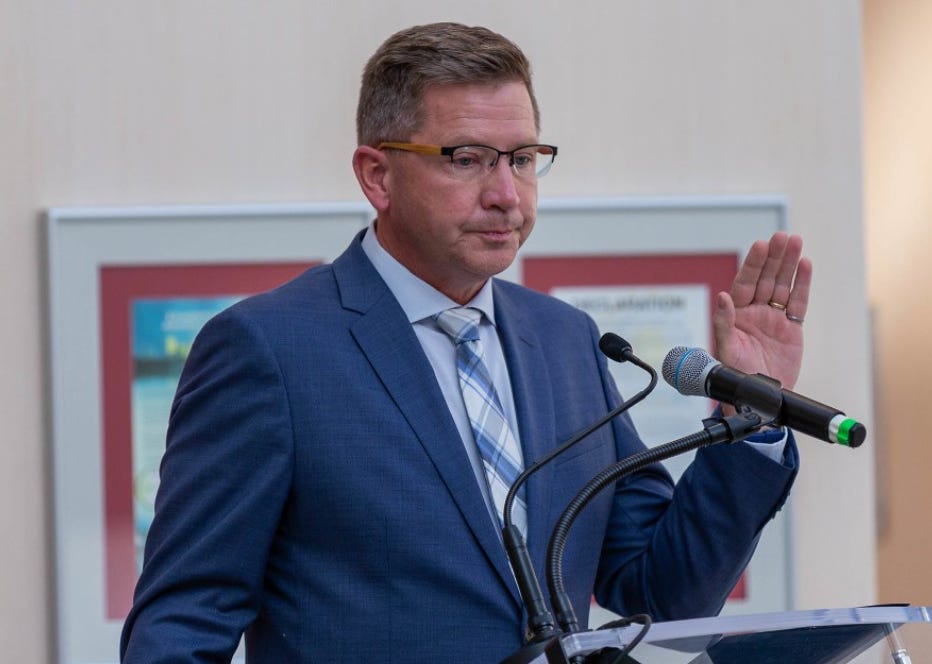
Meanwhile, Cllr. Hamilton was namedropped twice by Premier Smith as an example of her "good relationships” with members of Edmonton City Council and is a previous guest of UCP Ministers at throne speeches. While these two may not have attended UCP fundraisers like Edmonton Police Chief Dale McFee, they certainly have traction with the UCP, which makes their inaction for Edmonton all the more galling.
Cllrs. Cartmell and Hamilton, Chabot and Sharp: If they aren't listening to you, resign in protest. If not, you are to blame for this inaction.
Things are only getting worse as we spiral into a new phase of poverty policing with the Compassionate Intervention Act. This week, Edmonton Police hosted a press conference to drum up more fear about unhoused people in the city. Are Edmontonians really buying Chief McFee’s solution: violence stacked on violence instead of allocating meaningful budget to meet people’s basic survival needs?
Can we not see how this playbook is being rolled out across North America?
Whether it’s McFee building his next budget, Michael Shellenberger stamping out safe supply or the New York Times attacking Oregon decriminalization, the language around unhoused encampments is being pivoted to “open-air drug scenes.” It’s never “lack of housing affordability” — it’s always drugs. Who does this narrative serve?
We wouldn’t sit and wait for eight months during the Calgary floods or Fort Mac wildfires — why are we content to wait now while our neighbours become increasingly desperate? In the time since the task force announcement, hundreds have died from entirely preventable drug poisonings while public healthcare collapses (or, more accurately, is being collapsed) under the weight of skyrocketing ambulance calls.
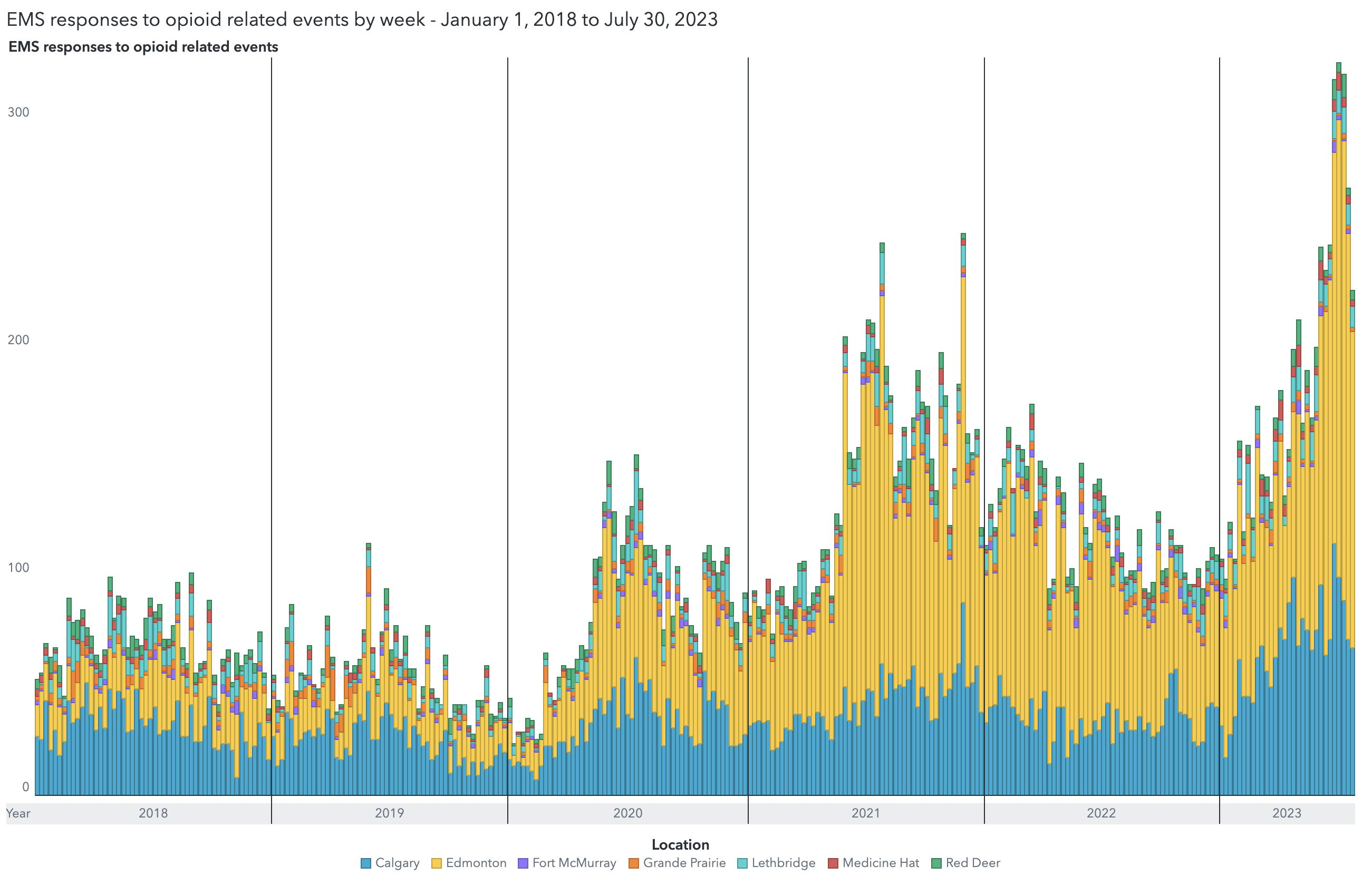
In three months, we’ll be back to frostbite amputations and deaths in the cold. Real emergency action must be taken now: low-barrier shelters, housing, overdose prevention sites and safe supply access. Are these councillors going to let our cities die for two years until their next election when they can don the cape and release another rented army of cops into the streets?
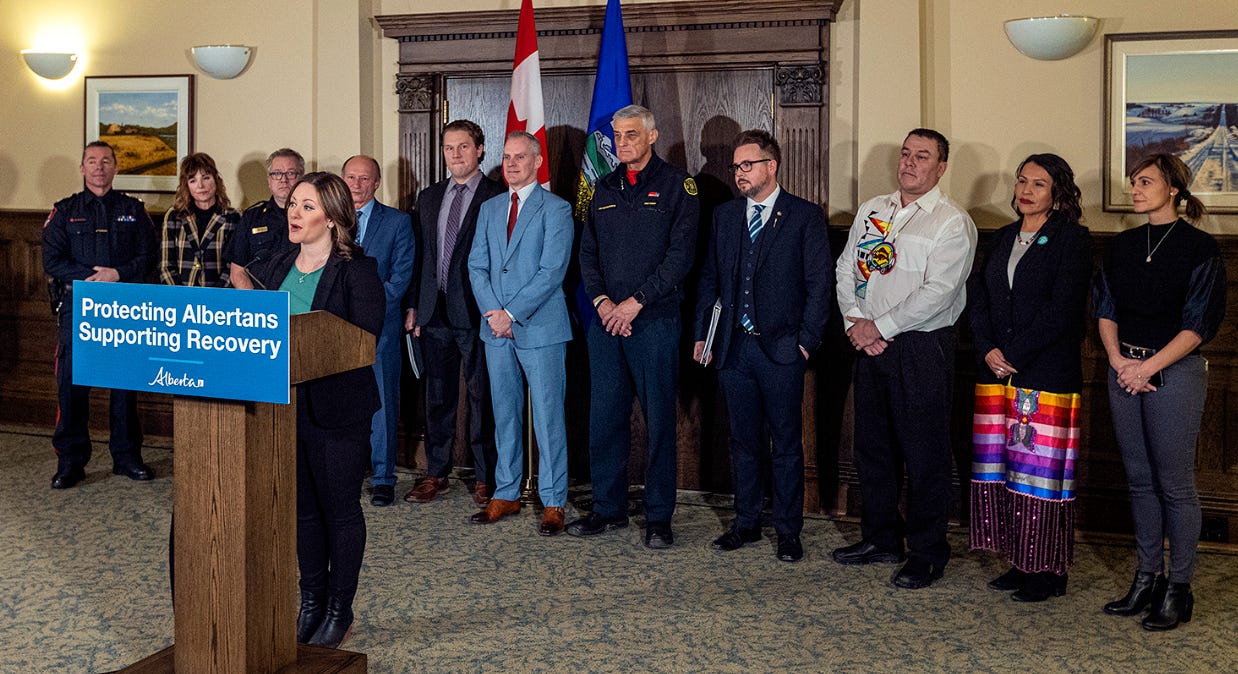
This is all especially infuriating because these councillors, hand-picked by the UCP, have the direct ear of the Cabinet and the Premier. What do they have to show for it? What are the big ideas?
What are they even asking for? I wanted to find out.
Conversation with Councillor Cartmell
I reached out to Councillors Cartmell and Hamilton back on May 18, as the provincial election was looming. I received a reply from Cllr. Cartmell on June 6 and never heard from Cllr. Hamilton.
Here was my message to them:
Following the announcement of the Compassionate Intervention Act that the UCP will table if they win the upcoming election, I wanted to check in with you about your position in the public safety task force.
As member of the task force, did you ask for this legislation?
Do you support this legislation?
If not, will you resign from the task force in protest against this cruel and ineffective approach?
Here is Cllr. Cartmell’s response in full, as he requested:
Good morning;
Thank you for your message.
Note that I am responding to your personal inquiry. If you choose to share this forward, please include all of my comments.
The Task Force did not ask for this legislation.
I believe that we (City Council, City Administration, the residents of the City, the Province, all of us) need to determine, define and support a spectrum of solution strategies. Our most vulnerable residents each have an individual life experience, and that means each person will need a system that ultimately offers individualized support.
Do I support this legislation?
On the one hand, I understand the perspective that no one should be compelled to receive treatment.
When we talked about vaccines during the pandemic, this perspective was shared by many. And at that time, with respect to the specific concern of vaccines, my view was that receiving a vaccine should remain a personal choice - but choices had consequences. If you chose not to get vaccinated, the consequences were that your access to public spaces was restricted from a "greater good " perspective, to preserve a particularly fragile health system.
Obviously this is not the same as compelling an individual for specific health treatments, but it speaks to the quandary of where individual choice stops and state intervention begins. And I have been charged with wrestling with such decisions for years now. They are not easy, each side of these decisions has its advocates and critics.
On the other hand, when a person reaches a point where they have lost the capacity to make decisions to keep themselves and those around them safe, then the compassionate thing to do is intervene on their behalf.
When I consider such matters, I think about what I would want if it was my child. If one of my kids was in another city, if we had lost touch, if they were on the streets, in a drug addled state, attacking others with violent outbursts or sitting a pool of their own vomit or excrement, would I want someone to intervene? Would I want someone to take them to a place where they could "dry out", and perhaps become lucid, if only for a moment? Would I want someone to take them to a place where they could consume under supervision, and perhaps attain a lucid state of mind? Absolutely I would - I would want "us" to try just about anything to help my child heal. I certainly would not want people to step over them on the sidewalk, ignore their condition, on the premise that sooner or later they will ask for help, and help should not be offered until they do.
You state that this approach is "cruel and ineffective." I don't believe in such over-arching generalized statements.
Would compassionate intervention work for some? Yes, based on feedback I have received from persons that said it worked for them. Would it work for everyone? Is it the single stand-alone strategy? Of course not. That's why statements like yours are rather absurd. There is no one-size-fits-all answer for this. There is no one solution set that will work for everyone, and there is not one strategy that can be completely dismissed as completely ineffective in every instance. There are no absolutes.
Would I resign from the Task Force? No. I would rather that City Council have a voice (or two) at that Task Force table. There are a number of subjects being discussed there, and I would want Council to continue to have a voice in those discussions. Resigning from the Task Force means resigning from all of those discussions, not just the compassionate intervention conversation. You can only resign once.
Thank you again for your message.
Sincerely,
Tim Cartmell
Task force members
Want to send a message to Edmonton’s Task Force members? Emails are below. Calgary members can be found here.
Tim Cartmell, pihêsiwin Ward Councillor, City of Edmonton: tim.cartmell@edmonton.ca
Sarah Hamilton, sipiwiyiniwak Ward councillor, City of Edmonton: sarah.hamilton@edmonton.ca
Mike Ellis, Minister of Public Safety and Emergency Services (Chair): mike.ellis@gov.ab.ca Note: he won’t listen.
Rebecca Schulz, former Minister of Municipal Affairs, now Minister of Environment and Protected Areas: rebecca.schulz@gov.ab.ca
Chief Billy Morin, Enoch Cree Nation, Special Advisor Indigenous Relations: billy.morin@gov.ab.ca
Chief Isaac A. Laboucan-Avirom, Woodland Cree First Nation: isaac@woodlandcree.net
Dale McFee, Chief of Police, Edmonton Police Services: dale.mcFee@edmontonpolice.ca
Kerry Bales, Senior Program Officer, Provincial Addiction and Mental Health, Alberta Health Services: kerry.bales@ahs.ca
Graeme McAlister, Associate Executive Director, EMS Operations, Alberta Health Services Edmonton Zone: Graeme.McAlister@ahs.ca
Andre Corbould, city manager, City of Edmonton: andre.corbould@edmonton.ca
Joe Zatylny, Fire Chief, Edmonton Fire Rescue Services: joe.zatylny@edmonton.ca



